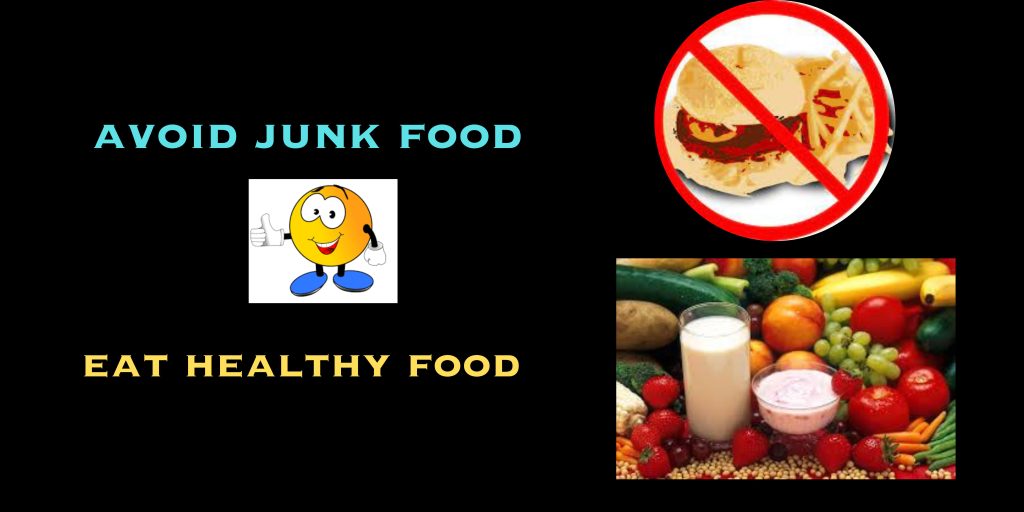
Why We Need To Avoid Junk Or Eat Healthy?
It is generally advised to prioritise healthy eating practises and limit junk food intake. The following are some advantages of emphasising nutrient-dense foods:
- Nutritional value: Vegetables, fruits, whole grains, lean meats, and legumes are nutritious foods that offer necessary vitamins, minerals, and antioxidants that promote optimum health and wellbeing. They supply your body with the nutrition it needs to stay healthy and build a strong immune system.
- Weight management: Junk food frequently lacks vital nutrients while being heavy in calories, bad fats, added sugars, and sodium. Junk food eating on a regular basis can lead to weight gain and an elevated risk of obesity. On the other hand, a well-balanced and nourishing diet can support your efforts to maintain a healthy weight.
- Energy levels and productivity: Healthy diets give you long-lasting energy, which can increase your concentration and productivity all day long. A continuous flow of energy is provided by nutrient-dense meals and snacks, which include complex carbs, lean proteins, and healthy fats. These foods also assist in regulating blood sugar levels.
- Disease prevention: A diet high in whole foods and low in processed foods is linked to a lower chance of developing chronic illnesses like heart disease, type 2 diabetes, some malignancies, and problems linked to obesity. Foods high in nutrients have ingredients that promote heart health, control blood pressure, reduce inflammation, and improve immunity in general.
- Better digestion: Dietary fibre, which supports healthy digestion and helps avoid constipation, is often present in higher amounts in healthy foods. Additionally, fibre supports a healthy gut microbiome, which has been connected to a number of elements of general health, such as immune system performance and psychological well-being.
- Improved mood and mental health: Vitamin and mineral deficiencies, in particular, can have an impact on mood and mental health. higher mood, a lower risk of depression, and higher cognitive performance can all be attributed to eating a diet that is well-balanced and rich in nutrients.
- Long-term well-being: Making healthy eating choices a priority is an investment in your future health and happiness. A healthy lifestyle, which includes regular exercise and good self-care, includes a balanced food as a key component. As you get older, it may result in increased longevity and a greater standard of living.
While it’s vital to concentrate on eating healthy foods, it’s also OK to occasionally indulge in sweets or comfort foods in moderation. Strive for balance, pay attention to your body’s hunger and fullness cues, and make deliberate decisions to feed yourself as much as you can with nutrient-dense options.


Diet For Healthy Lifestyle
In order to preserve general wellbeing and encourage a healthy lifestyle, a balanced diet is essential. Here are some general recommendations for a healthy, balanced diet:
Consume a variety of foods: Make sure your diet contains a wide selection of fruits, vegetables, whole grains, lean proteins, and healthy fats. This guarantees that you get a variety of important nutrients.
Vegetables and fruits: Aim to eat at least 5 servings of these foods each day. They are abundant in fibre, antioxidants, vitamins, and minerals. When feasible, choose colourful foods and fresh or frozen produce.
Whole grains: Choose whole grains like brown rice, quinoa, whole wheat bread, and oats in favour of refined grains. When compared to their refined cousins, they offer more fibre, vitamins, and minerals.
Lean proteins: Add lean protein sources to your meals, such as poultry, fish, lentils, tofu, and low-fat dairy items. These are crucial for the development and repair of muscle.
Eat foods high in healthful fats like avocados, nuts, seeds, olive oil, and fatty seafood like salmon as part of a balanced diet. These fats offer crucial nutrients and assist heart health.
Reduce your intake of packaged and processed foods, which can contain high levels of preservatives, harmful fats, and added sugars. When possible, choose fresh, whole foods.
Keep your portion proportions under control to prevent overeating. For better portion control, use smaller bowls and plates.
Keep hydrated by consuming enough water throughout the day. Avoid drinking too many sugary drinks and substitute water, herbal tea, or infused water instead.
Reduce your intake of meals and beverages that are high in added sugars and sodium. Limit added sugars and salt. Consider choosing low-sodium and low-sugar options by reading food labels.
Eat more slowly and with awareness as you practise mindful eating. Consume when you are hungry and stop when you are satisfied. This may aid in reducing calorie intake.
Remember, it’s crucial to speak with a medical expert or a qualified dietitian who can offer personalised guidance based on your particular requirements, medical problems, and nutritional objectives.
Eat Egg Or Non-Veg (if its comfort for you because it also beneficial for your diet)


Essential vBoth chicken and eggs are top-notch sources of high-quality protein and are packed with a variety of vital elements that are good for our health. They are deemed advantageous for the following reasons:
Protein: Both chicken and eggs are abundant in complete proteins, which are proteins that include all the essential amino acids our bodies require. The production of hormones and enzymes, tissue growth and repair, and immune system maintenance all depend on protein.
vitamins and minerals can be found in eggs and chicken. Vitamins A, D, E, and B vitamins including B12, riboflavin, and folate are all present in eggs in good amounts. They also supply minerals like selenium, iron, and zinc. Niacin, thiamin, and B6 are among the B vitamins and minerals that are abundant in chicken.
Essential vBoth chicken and eggs are top-notch sources of high-quality protein and are packed with a variety of vital elements that are good for our health. They are deemed advantageous for the following reasons:
Protein: Both chicken and eggs are abundant in complete proteins, which are proteins that include all the essential amino acids our bodies require. The production of hormones and enzymes, tissue growth and repair, and immune system maintenance all depend on protein.
Weight management: Both chicken and eggs have advantages in this regard. They include a lot of protein, which aids in promoting satiety and lowering cravings for food. By keeping you feeling fuller longer, eating enough protein in your diet might help you lose weight or maintain your current weight.
Muscle maintenance and repair: The protein included in chicken and eggs is crucial for maintaining and repairing muscles. For bodybuilders, athletes, or others who engage in regular physical exercise, it supplies the essential amino acids needed to develop and repair muscular tissues.
Essential vBoth chicken and eggs are top-notch sources of high-quality protein and are packed with a variety of vital elements that are good for our health. They are deemed advantageous for the following reasons:
Protein: Both chicken and eggs are abundant in complete proteins, which are proteins that include all the essential amino acids our bodies require. The production of hormones and enzymes, tissue growth and repair, and immune system maintenance all depend on protein.
Choline and omega-3 fatty acids are two elements found in eggs that help to enhance brain health. Both newborn brain growth and adult cognitive function depend on choline. An increase in cognitive performance and a decreased risk of neurodegenerative disorders have both been associated with omega-3 fatty acids.
While eggs and chicken can be included in a healthy diet, it’s crucial to consume them in moderation and pick cooking techniques that use as little extra fat or oil as possible. Additionally, because everyone has different nutritional requirements and tastes, it’s always a good idea to get expert medical counsel or dietary guidance from a qualified dietitian.
